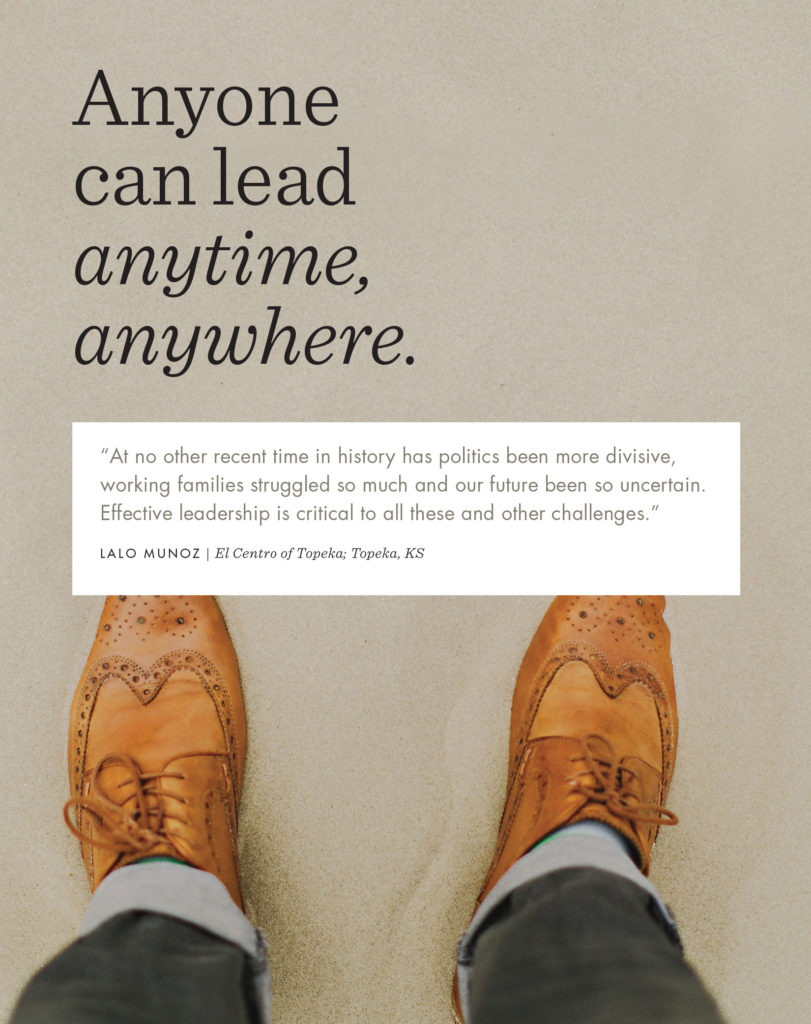New KLC leadership book: 10 years of strengthening Kansas communities

The Kansas Health Foundation has long valued the role community leadership plays in in creating a healthier Kansas. In 2005, that belief was transformed into a tangible, permanent step with the announcement of the creation of the Kansas Leadership Center (KLC), which opened in 2007. Now, as KLC approaches its 10-year anniversary of working to foster leadership for stronger, healthier and more prosperous Kansas communities, KHF and KLC are working on a book featuring real stories from across the state about why leadership matters and how it impacts us all. Below, you’ll see an excerpt from Ed O’Malley, KLC President and CEO.
******
I can’t help but think about politics when I think about “anyone can lead, anytime, anywhere,” our second leadership principle.
As a former legislator, I love an election as much as anyone. I’m intrigued with races from city hall to the White House. I was a proud dad when my two third graders, back in 2012, snuck out of bed so they could watch one of the Presidential Debates that year. And, as much as I love elections, I also feel all the focus on the candidates can warp our sense of who we need to exercise leadership. (Hint: it’s us.)
It can be easy to place an inflated sense of importance on our elected officials. They are important, yes. And, their service should be much appreciated. It’s important to remember that elected officials have a role in solving tough, daunting challenges; but theirs is not the only role.
During my first day in the Kansas Legislature in 2003 my father sent me the following two lines of poetry from Samuel Johnson:
How small, of all that human hearts endure,
That part which laws or kings can cause or cure.
He was doing his part to help me remember the limitations of my office. Or conveyed another way, that no one can lead all of the time, everywhere.
Similarly, Paul Tillett in the 1965 volume titled The Political Vocation wrote:
Politicians are important to the system, but it is easy to overestimate their capacity to achieve reform … They will more likely respond to than suggest far-reaching changes in their environment.
So, if Samuel Johnson, Paul Tillett and my father are correct, elected officials can only do so much. Not only can “anyone lead, anytime, anywhere,” but if we want progress on the issues most important to our organizations and communities – to the adaptive challenges – we need to compel more people to lead, frequently, wherever they can.
*******
Few heads turn when Broderick Crawford slips in unannounced to the makeshift college architecture classroom in downtown Kansas City, Kan.
It’s near mid-term and the University of Kansas students are in the middle of their informal presentations about the Jersey Creek Trail Park renovation ideas. They have joined the massive grassroots effort to renovate the trail that could be an inner city crown jewel. The students spend every Friday meeting in Kansas City, Kan. with their professor Shannon Criss. They’ve biked, walked and explored every nook and cranny of the deteriorating trail and surrounding parkland that snakes through northeast Kansas City, Kan. They’ve laid eyes on the forgotten playgrounds, fractured asphalt path and splintered wooden benches.
As Crawford pops in with a guest, students are presenting practical design solutions to address community engagement, zoning challenges and key connection points along the trail.
It’s the kind of free exchange of innovative ideas that Crawford and a team of civic-minded community members dreamed about for years.
“I’m elated,” says Crawford, executive director of the NBC (New Bethel Church) Community Development Corp.
Crawford, an alumnus of the Kansas Leadership Center, has invested fully in the KLC leadership principle “anyone can lead, anytime, anywhere.”
“We have multiple individuals, multiple organizations, multiple groups now collaborating,” he says, “with a single voice, with a single purpose, with a single mission – and that’s to improve physical activity in this county.”
Crawford learned early on that he had to inspire others. He had to get others to believe they could lead the community towards better health. It wasn’t just the mayor’s job or the public health directors’ job; it was the responsibility of scores of citizens. It couldn’t just be one church. It couldn’t be one voice. What happens if one person burns out? The group has to mobilize others to accomplish their goal.
It’s why NBC is one part of a multi-faceted coalition that includes Healthy Communities Wyandotte, Community Health Council of Wyandotte County, FreeWheels for Kids, UG Parks and Recreation, the University of Kansas School of Architecture, the Latino Health for All Coalition and a list of organizations that grows by the week. The organizations are working to improve health in Wyandotte County, which regularly ranks among the worst in the state for health outcomes.
The agencies could be frustrated that the Unified Government of Wyandotte County and Kansas City, Kansas hasn’t renovated the trail. They also know the Unified Government doesn’t have the $1 million-plus for revitalization. Change starts with them. It’s why so many agencies are rallying support and awareness.
******
For the rest of the story, and other examples of the five principles that the Kansas Leadership Center works to imbed throughout Kansas, look for the new KLC book coming out later this summer. Also, please check out www.kansasleadershipcenter.org to learn more about KLC and view different opportunities for leadership training.
Connect With Us
Sign Up for KHF's Electronic Newsletters
Learn more about the latest Foundation news, grant opportunities, stories and health articles by signing up for KHF’s e-newsletters. Join today!